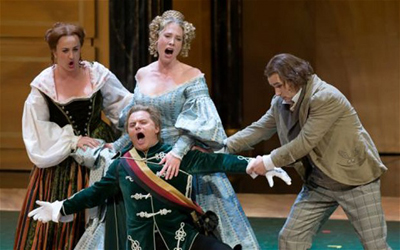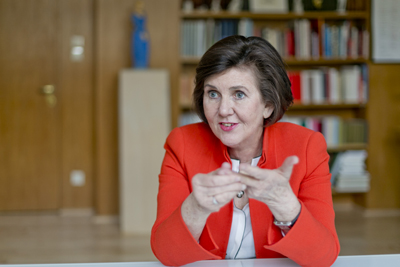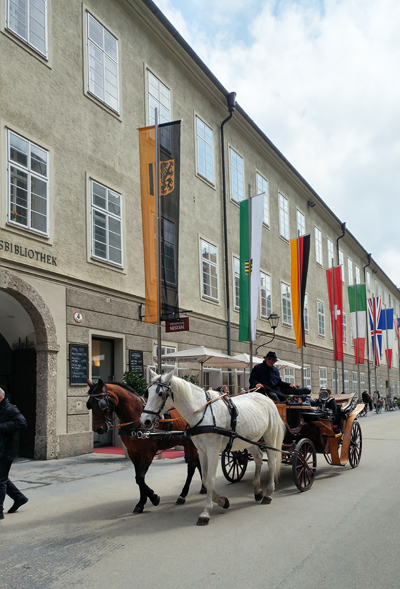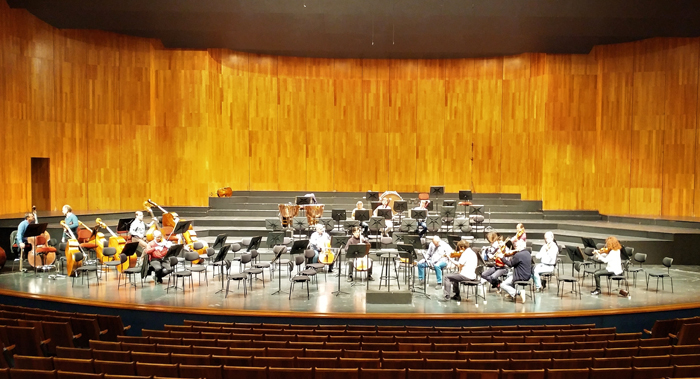Music: Behind the Scenes of Salzburg's Festivals - History and Update
By Mark Laiosa
arttimesjournal October 19, 2019
 Die Meistersinger |
The awe of experiencing a great performance is like viewing an iceberg, only 10 percent is visible, that came to mind during a recent backstage tour of the 2019 Salzburg Easter Festival and observing the preparation for Wagner's Die Meistersinger von Nürnberg. The festival runs nine days surrounding Palm Sunday and Easter with two concerts, an oratorio, opera, and a contemporary chamber opera, this year featuring the world premiere of Philipp Maintz's Thérèse, based on the Emile Zola's novel Thérèse Raquin.
The 2019 festival preparation began three years ago blending music that builds on world class performances with concerts and activities that keep repeat visitors coming while appealing to new audiences "work for the audience of the future, get them today" said Dr. Helga Rabi-Stadlier president of the Salzburg Festival in an exclusive interview. She became the driving force of the festival in 1995. Dr. Rabi-Stadlier, an attorney by training wore many hats: journalist, and later, a politician. When she became the festival's president, she declared her political neutrality and focused on maintaining the performance and repertoire standards. Now she is preparing the 100th year Jubilee in 2020 and her retirement with no signs of slowing down. In August, Trevor D. Traina, US Ambassador to Austria, presented Dr. Rabi-Stadlier with the Cultural Icon Award for her "significant contribution to US-Austrian cultural relations."
 Dr. Helga Rabl-Stadler (Salzburger Festspiele cc. Doris Wild) |
Among the team are: Artistic Director Markus Hinterhäuser who is extending his contract to 2026; Easter Festival Music Director Christian Thielemann who will be leaving at the end of 2022 with his Sächsische Staatskapelle Dresden and will be replaced by different orchestras and conductors each year. Nicolas Bachler will assume the managing directorship for the Easter Festival in 2020 and add the responsibility of Artistic Director in 2022. Current Managing Director and Intendant Peter Ruzicka announced in May that he will retire in 2020.
The Salzburg Festival's roots go back to World War One. Amid the traumatizing European war, Max Reinhardt theater impresario, wrote in 1917, "It has become apparent that the arts are not merely a luxury for the rich and sated but food for the needy." Reinhardt lived in a lake side Rococo palace Schloss Leopoldskron outside of Salzburg's city center. In this comfortable setting within a balconied library, he met with composer Richard Strauss and writer Hugo von Hofmannsthal to embark on a new enterprise - an arts festival and the building of a festspielhaus a performance space and an academy of the performing arts that would uphold the highest performance standards, draw international visitors and provide employment for the local crafts people. Today, Schloss Leopoldskron is a hotel and conference center that has maintained its exclusive feeling. Stop by and tour the wood paneled library and grounds and have a beverage and homemade snack at the Meierhof Café overlooking the small lake Leopoldskron Weiher. Sharp-eyed fans of the Sound of Music (1964) will recognize the lakeside setting.
 Outside the Festspielhaus (photo: Mark Laiosa) |
Hofmannsthal's Jedermann (Everyman), a morality play, was the opening performance staged in front of the Salzburg Cathedral. With few exceptions, it's been the traditional opening of the Salzburg Festival. Members of the Mozarteum Orchestra and the Vienna State Opera Orchestra performed in various venues, among them, the large Festspielhaus (completed in 1927) and the riding school Felsenreitschule (Rock Riding School), an open-air theater that was fitted with a retractable roof in the 1960's. Through the 1920's and early 1930's the festival kept up with the times with the first concert broadcasts taking place in 1925. The Nazi's annexation of Austria in March 1938 saw Bruno Walter and Arturo Toscanini banned from performing. The focus was on German Art with international artists and the repertoire eliminated. Founder Max Reinhardt died in 1939 during his exile in America.
The importance of the arts was reaffirmed three months after the ending of World War Two with festival concerts and opera performances. Bernard Paumgartner, associated with the festival from the very first days took the helm and focused on the works of Mozart and opera. He set the stage for the 1957 appointment of Herbert von Karajan as artistic director of the Salzburg festival, including stage direction, programming, and engaged performers for the season. He brought his group, the Berlin Philharmonic Orchestra to Salzburg as the resident festival orchestra. In 1964, von Karajan shared the responsibilities with a directorate and retained final say ensuring performances met the highest standards possible. In 1973 von Karajan began the Salzburg Easter and Whitsun (Pentecost) concerts with the Berlin Philharmonic and performed three evening concerts devoted to Bruckner Symphonies. Von Karajan died in 1989.
The festival evolved over the years with Baroque operas and oratorios being introduced in the 1990's. Riccardo Muti became the director and expanded the repertoire to include little known but worthy bel canto operas of the 18th and 19th centuries. Muti continued the expansion to contemporary works, developing a good working relationship with Cecilia Bartoli and renewed her contract through 2026. In 2020 she will be singing Norina in Donizetti's Don Pasquale conducted by Gianluca Capuano in the Whitsun Festival. Bartoli will also present music of multi-talented Pauline Viardot-Garcia and her circle of writers and composers.
 Festspiele musicians warming up (photo: Mark Laiosa) |
The 2020 Salzburg Easter Festival will feature the four-act version Verdi's Don Carlo with a new prologue composed by Manfred Trojahn commissioned by the festival and the Semperoper Dresden. Vera Nemirova is the director and Christian Thielemann will conduct. "Getting them today" is echoed throughout the festival offering school classes free entry to select performances. The akzente Salzburg (access Salzburg) is reaching out to school children through immersive programs addressing contemporary interests, modern dance, hip hop and rap. One example, the latest iteration of the patter song is rap, as heard on Broadway in Hamilton and is a common ground for discussing opera and storytelling. It will take time to change opera from an "elitist institution" to a cultural form for Everyman.
Keeping up with the global trend for easing the carbon footprint, the Whitsun and Summer Festivals have partnered with the local transportation system. Each ticket entitles the holder to ride the barrier-free trolleys, buses, or S-Bahn inside Salzburg's core-zone. It is valid three hours before the curtain and convenient for pre-concert dinner at unique restaurants, like Magazin, a former World War Two ammo depot built into the side of the towering Mönchsburg. The munitions have been replaced with magnums, menus reflecting the best of that day's market prepared with a contemporary twist. Post-concert free transport ends with the last run of nightly service. There is wheel-chair accessibility for the Grosses Festspielhaus and the Felsenreitschule. Visitors with hearing impairments will find induction loops available at the Haus für Mozart, Felsenreitschule and the Salzburg State Theater.
Throughout the year there is music in Salzburg. January sees and hears the Internationale Mozartwoche and celebration of Mozart's birthday on January 28th, continuing into February; the Easter Festival in April and fifty days later the Salzburger Pfingstfestspiele (Pentecost). As the year warms up so do the singers participating in the Chorfestival, local and international vocal ensembles performing throughout Salzburg. In the full flush of central European summer, the glorious Salzburg Festival runs for six weeks of opera, concert, jazz, dance, and theatre performed in the concert halls, squares and streets where "Wolfie" himself once walked. October and it is time to head indoors and enjoy the Salzburg Kulturtage, orchestral and chamber works, some in exciting combinations with dance and spoken word. Music in all its flavors can be experienced in Salzburg.
More information at www.salzburg.info.
